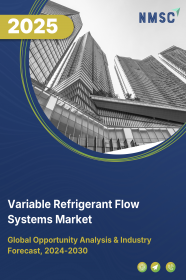
Taiwan Heat Exchangers Market by Type (Shell & Tube, Plate & Frame, Air Cooled, and Others), by Material (Metals, Alloys, and Brazing-CLAD), and by End User (Chemical, Energy & Power, Heating, Ventilation, Air Conditioning, and Refrigeration (HVACR), Food & Beverage, Pulp & Paper, and Others)– Opportunity Analysis and Industry Forecast, 2024–2030
Industry: Retail and Consumer | Publish Date: 04-Dec-2024 | No of Pages: 118 | No. of Tables: 86 | No. of Figures: 51 | Format: PDF | Report Code : RC1566
US Tariff Impact on Taiwan Heat Exchangers Market
Trump Tariffs Are Reshaping Global Business
Market Overview
The Taiwan Heat Exchangers Market size was valued at USD 146.0 million in 2023, and is predicted to reach USD 245.9 million by 2030, with a CAGR of 7.1% from 2024 to 2030.
Heat exchangers is engineered to facilitate heat transfer between fluids without direct contact, are widely utilized across industrial, commercial, and residential domains, encompassing HVAC systems and refrigeration units, to efficiently heat or cool fluids or air. They operate by enabling heat transmission through barriers such as solid walls or arrays of plates or tubes, enabling various functions such as water heating in boilers or air cooling in air conditioning units.
These devices are offered in diverse designs tailored to specific needs, ranging from basic radiator coils to advanced systems deployed in chemical processing plants and power generation facilities. They fulfill essential roles across numerous industries and applications, including regulating air temperatures in buildings, facilitating steam production in power plants, managing temperatures during chemical reactions, and aiding in food processing, among others. Additionally, they serve as vital components in automotive cooling systems and find extensive applications in aerospace, marine, and wastewater treatment sectors, where they are instrumental in efficient thermal management and energy transfer.
Increasing Demand for HVAC Systems Drives Taiwan’s Heat Exchangers Market
The increasing demand for HVAC systems is a driving force behind the growth of Taiwan's heat exchangers market. With the expansion of construction projects and infrastructure development, there is a growing need for heating, ventilation, and air conditioning (HVAC) systems in both residential and commercial buildings.
Heat exchangers play a critical role in these HVAC systems by facilitating efficient heat transfer and temperature control. As Taiwan focuses on energy efficiency and sustainability, the demand for HVAC systems equipped with heat exchangers is expected to rise, thereby propelling market growth in the country.
Growing Industrialization and Urbanization in Taiwan Drive Market Growth
The burgeoning industrialization and urbanization in Taiwan are significant drivers of market growth. With rapid urban development and the expansion of industrial sectors, there is a corresponding increase in demand for various products and services, including heat exchangers.
As industries expand and urban areas grow, there is a greater need for infrastructure, commercial buildings, and residential spaces, all of which require efficient heating, ventilation, and air conditioning (HVAC) systems. Heat exchangers play a crucial role in these systems, driving market growth as they are essential components for heat transfer and thermal management.
Additionally, the rise in industrial activities further boosts demand for heat exchangers in various industrial processes, such as chemical manufacturing and power generation, contributing to overall market expansion in Taiwan.
High Installation and Maintenance Costs Restrain Market Growth
High installation and maintenance costs serve as significant restraints on market growth in Taiwan. The substantial initial investment required for purchasing and installing heat exchangers, coupled with ongoing maintenance expenses, poses challenges for businesses, particularly those with limited financial resources.
Despite the long-term cost savings offered by heat exchangers through enhanced energy efficiency, the perceived financial burden may deter widespread adoption, thereby impeding market growth. Lowering installation and maintenance costs or offering innovative financing options could alleviate this constraint and spur market growth in Taiwan.
Integration with Renewable Energy Systems Creates a Market Opportunity
Integration with renewable energy systems creates a significant market opportunity in Taiwan by enabling the efficient utilization of thermal energy generated from renewable sources. Heat exchangers play a crucial role in renewable energy systems, capturing and transferring heat for various applications such as power generation and thermal management.
As Taiwan seeks to transition towards sustainable energy solutions and reduce dependence on fossil fuels, there is an increasing need for heat exchangers to optimize energy conversion processes and enhance system efficiency. This integration not only expands the application scope of heat exchangers but also contributes to Taiwan's efforts in achieving energy sustainability goals, thereby driving market expansion in the country.
Competitive Landscape
Several market players operating in Taiwan’s heat exchangers market include Alfa Laval AB, Johnson Controls International plc, Carrier Global Corporation, Lennox International Inc., Trane Technologies plc, API Heat Transfer Inc., Kelvion Holding GmbH, Xylem Inc., Danfoss Group, and General Electric Company among others. These companies are adopting various strategies such as product launches to remain dominant in the heat exchangers market.
Key Market Segments
By Type
-
Shell & Tube
-
Fixed Tube Heat Exchangers
-
U-Tube Heat Exchangers
-
Floating Head Heat Exchangers
-
Other Shell & Tube Heat Exchangers
-
-
Plate & Frame Heat Exchangers
-
Gasketed Plate & Frame Heat Exchangers
-
Welded Plate & Frame Heat Exchangers
-
Brazed Plate & Frame Heat Exchangers
-
Other Plate & Frame Heat Exchangers
-
-
Air Cooled
-
Forced Draft Heat Exchangers
-
Induced Draft Heat Exchangers
-
-
Others
By Materials
-
Metals
-
Alloys
-
Brazing-CLAD
By End User
-
Chemical
-
Energy & Power
-
HVACR
-
Food & Beverage
-
Pulp & Paper
-
Others
Key Players
-
Alfa Laval AB
-
Johnson Controls International plc
-
Carrier Global Corporation
-
Lennox International Inc.
-
Trane Technologies plc
-
API Heat Transfer Inc.
-
Kelvion Holding GmbH
-
Xylem Inc.
-
Danfoss Group
-
General Electric Company
REPORT SCOPE AND SEGMENTATION:
|
Parameters |
Details |
|
Market Size in 2023 |
USD 146.0 Million |
|
Revenue Forecast in 2030 |
USD 245.9 Million |
|
Growth Rate |
CAGR of 7.1% from 2024 to 2030 |
|
Analysis Period |
2023–2030 |
|
Base Year Considered |
2023 |
|
Forecast Period |
2024–2030 |
|
Market Size Estimation |
Million (USD) |
|
Growth Factors |
|
|
Companies Profiled |
10 |
|
Market Share |
Available for 10 companies |
|
Customization Scope |
Free customization (equivalent up to 80 working hours of analysts) after purchase. Addition or alteration to country, regional, and segment scope. |
|
Pricing and Purchase Options |
Avail customized purchase options to meet your exact research needs. |

















 Speak to Our Analyst
Speak to Our Analyst





















